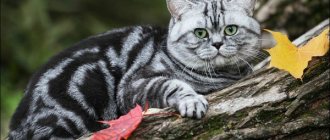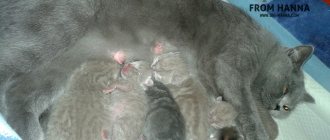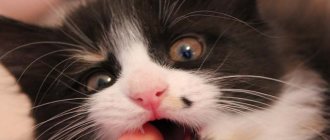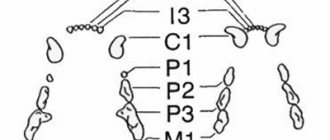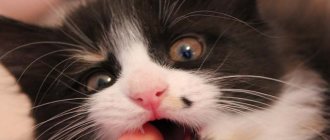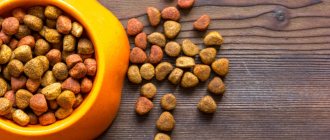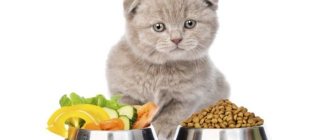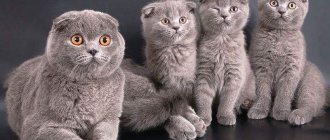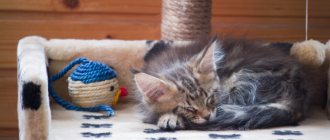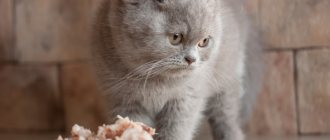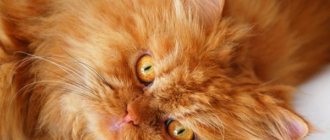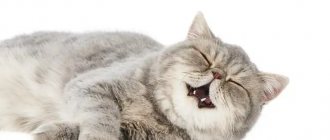Many new owners do not know how and what to feed their British cat. There may be several options, it all depends on the age of the animal, the characteristics of its health, as well as the employment of the owner himself.
The variety and balance of any pet’s diet directly affects its health and well-being. And the British cat is no exception. You should not skimp on your pet and buy cheap food of dubious quality or feed your cat from the common table.
Healthy eating rules
British cats, like any other, are descendants of wild cats, which are predators. This nuance must be taken into account when composing the diet of these animals. In the natural environment, wild cats feed mainly on raw meat; the plant component enters their body in a partially digested form. Based on this information, it becomes clear what to feed a British cat at home.
The basis of the diet of British cats should be fresh meat products, as well as vegetables and cereals, which are previously heat-treated.
The meat must be in the freezer for at least 3 days before feeding it to the cat. In this way, all pathogenic microorganisms and helminth eggs are killed. Vegetables are given both fresh and boiled, and porridge is made from grains.
To the question of what to feed a British cat if the owners are constantly busy at work and cannot devote much time to preparing food for their ward, the answer is obvious - buy industrial food for British cats, which already contains all the necessary components. Vitamins and minerals in ready-made food are selected in quantities equal to the cat’s daily needs.
It is also recommended to develop a routine and feed your British cat at the same time. To avoid problems, you should adhere to basic feeding standards:
- food should be at room temperature;
- after feeding, the bowl must be removed immediately, since bacteria quickly multiply in uneaten leftover food;
- It is better to mix the vegetable component and porridge with meat; in its pure form, British cats eat plant foods without much enthusiasm;
- the bowl should always be clean;
- fresh filtered and boiled water is available around the clock;
- After feeding, it is better to leave the British cat alone, not to play with it, but to let it lie down and rest.
An adult British cat needs to be fed twice a day. As for British kittens, it all depends on age: the smallest suckling babies begin to be fed 6-8 times a day, gradually increasing the interval between feedings and the portion.
Vitamins in the diet
An important aspect is the presence of age-appropriate vitamins that promote the active growth of the kitten. The number of feedings (meals) up to six months should be six, by 10 months - four. Frequent feeding is due to the small size of the stomach of British kittens.
It is recommended to keep British cats over a year old on 2-3 meals a day of dry and wet food; show cats can consume approximately equal portions of food of these types. All others are in the proportions of 70% dry food, 30% wet food.
At home, the daily menu includes lean meat (turkey, rabbit, beef, chicken and the like), internal and less valuable parts of slaughtered animal carcasses, marine varieties of lean fish, oats and wheat sprouts (sprouted), herbs, egg yolks , porridge from semolina, rice, buckwheat, barley, wheat cereals.
Grass must be included in the cat's diet; it can be bought or grown from seeds. Giving begins at 7-8 months. Cats independently determine which part is the top or base of the stems. The purpose of the grass is to ensure that the animal does not leave the premises during its life,
It is important to note that in order to exclude pet diseases, it is strictly forbidden to include raw yolks, and even more so, whites in any form. Milk is completely out of use at the age of 6-8 months. Changes in diet should take place in accordance with the advice or opinion of a veterinarian and the age and health of the cat.
Natural food
If the owner of a British cat has enough free time to prepare a varied menu for his pet, then a diet based on natural products is an excellent option.
Balanced food for British breed cats must necessarily consist of meat, fish, vegetables and cereals, as well as dairy products. During the molting period, it is recommended to add vitamin complexes and brewer's yeast to the food.
Not all meat and offal are suitable for feeding a British cat; the optimal types are:
- beef;
- veal;
- chicken;
- turkey;
- rabbit meat.
Before consumption, the meat must be defrosted and doused with boiling water. You can make minced meat from poultry, veal and beef by adding boiled cereals and vegetables, and also serve it boiled.
Liver (beef or chicken) can be given no more than once a week, like eggs. Many owners note that the British happily eat boiled kidneys, heart, tongue, and lungs.
If you feed natural food, then do not forget to include ocean or sea fish in your diet:
- cod;
- pollock;
- navaga;
- hake.
It is better to avoid feeding river fish: it contains less unsaturated fatty acids, which are responsible for the good condition of the coat, but there are a great many small bones that are dangerous for the animal. Before feeding, fish and other seafood must be boiled.
Vegetables on a British menu should be represented by root vegetables containing the least amount of starch; products such as:
- beet;
- carrot;
- white cabbage;
- cauliflower;
- cucumbers;
- zucchini.
The most useful cereals to feed are rice, buckwheat, oatmeal, and barley. It is imperative to feed your British cat fermented milk products without dyes or sweeteners:
- low-fat cream and sour cream;
- cottage cheese;
- natural yogurt;
- fermented baked milk;
- kefir
In what form should the food be given?
A cat needs food to be served either in small pieces or in large pieces from which smaller pieces need to be torn off. Minced meats and pates are not suitable for healthy cats: the absorption of nutrients from them is lower. And it’s not in the nature of a predator to eat formulas similar to those for children.
When preparing meat for serving, even before freezing, it is either divided into large pieces, or mixes of different components cut into smaller pieces are prepared - muscle meat, offal, vegetables if necessary, etc. The required amount of meat (for 1-2 servings) is placed in a bag or plastic container and sent to the freezer for at least 3 days.
If you give your cat large pieces of meat, then one serving may contain only 1-2 types of meat with the addition of, for example, a piece of liver. And then the types of meat alternate. Moreover, it is not necessary to alternate every day: you can feed one type of meat for a week, and then change it. At the same time, of course, we do not forget about calcium and fatty acids, which must enter the body either in the form of food or with dietary supplements.
Mixes can be a complete diet for a longer period, if everything necessary is taken into account. Some people add meat, bones, organs, vegetables, and even eggs to them at once. And then you just need to defrost it, wait until the temperature reaches room temperature, and serve it to the cat.
Ready-made feed
Your breeder will help you choose the best food for British cats. It is better to listen to his advice and purchase the same brand that was fed to the British kitten in the nursery. In this case, the animal will avoid possible gastrointestinal disorders associated with changing food.
You should not feed your British cat even for a short time with cheap brands of dry cat food, since it is made from second-rate products and cannot provide the animal with all the necessary substances.
Whiskas and Kitiket, advertised in the media, can lead to serious health problems when taken for a long time, and their harmful effects may not appear immediately. According to veterinarians, it is dry and wet food from these manufacturers that can provoke enlarged kidneys, urolithiasis and other serious diseases, the treatment of which will be expensive for the owner, and can cost the pet’s life.
Today, many breeders prefer the so-called “pedigreed” ready-made dry and wet food, which is available from almost all manufacturers. The most popular premium foods are:
- Royal Canin,
- Hills,
- Eukanuba.
Dry food for British cats, such as British Shorthair from Royal-Canin, is the most affordable and convenient for busy owners. Many people think whether it is possible to feed a British cat only dry food. Experts recommend alternating dry food without the addition of vegetable carbohydrates with wet meat and vegetable food in pouch bags or in the form of canned food.
When moving to a new home, a British cat experiences enormous stress and may be reluctant to eat. When choosing industrial dry and wet food for your pet, you should not immediately purchase a large volume. The approach should be individual, and only the cat himself will choose which food is best for him, since the list of worthy brands is quite wide.
Dry and wet food for the British
A more simplified method of feeding a British cat is based on ready-made food.
This option is great for owners who are unable to regularly prepare healthy food for their pets. The main thing is to choose the right food and calculate the daily intake in accordance with the age of the kitten. Responsible manufacturers create high-quality products that contain all the vitamin and mineral complexes necessary for the British. The range of such products includes a wide variety of compositions in dry and canned forms. When choosing, be sure to study the manufacturer’s recommendations published on the packaging!
Which food to choose, dry or wet, is up to you! You can combine these two types in an approximate ratio of 50/50, 60/40 or 70/30%. If the British cat is fed exclusively dry food, it is necessary to provide the animal with free access to clean drinking water.
The canned product is placed in a clean bowl in strictly measured quantities for one feeding. It is unacceptable to leave food “for later”; after each feeding, the animal’s bowl is cleared of product residues and thoroughly washed with clean water.
Advice from experienced breeders:
- For favorable growth and development, combine dry food with wet food. It is better to serve canned products for breakfast and dinner, and during the day you can feed your pet with dry food.
- Even if you feed your cat exclusively prepared food, regularly add pieces of fresh meat to the standard diet.
- The best food for a purebred British dog is premium (for example, Whiskas, Hills). Do not buy the budget version of the product, as these formulations do not contain enough necessary elements for proper growth and development. After feeding with cheap food, complications in terms of physical health are often observed. If you consume low-quality products, your kitten may develop urolithiasis and other chronic ailments.
- If you plan to castrate a mature British cat, buy special food with the appropriate label. These products contain a balanced complex of essential microelements, taking into account hormonal changes in the animal’s body. Similar rules are followed for cats that have been sterilized.
Prohibited Products
Feeding British cats does not involve food from the human table. Many Britons have strange preferences: some love buns and chocolate, others prefer pickles and pickled peas. Under no circumstances should you indulge these whims and feed the animal regular food, this can lead to serious illnesses.
You cannot feed the British pork, or include egg whites, butter, river fish, any sweets, baked goods, as well as fried, smoked and pickled foods in the diet. Giving milk is also not recommended as it can cause diarrhea.
Cats of any breed should be fed only healthy food that has a beneficial effect on their health.
Welsh pasties
These are baked goods that are small buns, somewhat reminiscent of scones. The dough practically melts in your mouth, which is what makes Welsh pasties so delicious - you may not even notice how you eat a large portion! You can choose the option without additives or with juicy currants, eat pies and with butter or jam.
A child’s fears can be overcome: phrases that will help parents in this matter
Stylists advise real men to take a closer look at a crew-neck jumper
If your hair is thin and not happy with its length, you can still make a bun: 3 ways
Diet of pregnant and lactating cats
The nutrition of British cats that are pregnant or have just lambed should be enhanced and contain as much beef, veal and liver as possible. A pregnant British cat should be fed strictly in portions and not overfed, otherwise the kittens will be large and it will be difficult for her to give birth to them.
A nursing cat should not feel hungry; during lactation, the number of feedings increases up to 3-4 times. Portions are calculated based on the needs of the animal, its weight and the number of suckling kittens.
In the first days after giving birth, a British cat may lose its appetite; this is a completely normal reaction of the body. Afterwards, they usually love to eat and eat often and in small portions.
The amount of water consumed by the cat during this time also increases. A special feature of the diet of a young cat mother is the introduction of beef or chicken broth into the diet. It is given warm to improve lactation.
Pork pie
A piece of pork in a crispy pastry may not seem too appetizing, especially when you consider that there is also a piece of jellied meat in the filling, but it is nevertheless one of the key dishes of British cuisine. Usually the pies are made small and served cold. However, you can eat them with hot sauce, or you can heat them up and serve with peas or gravy.
Don’t “eat up” your problems with food: 10 ways to achieve intuitive eating
What haircut to get to highlight the beauty of a big nose: 10 fashionable ideas
Faster than a fired bullet: what speed do the winds reach on Jupiter?
Nutrition for spayed and neutered British dogs
Food for British cats after castration or sterilization differs in composition from the diet of a healthy cat. After surgery, not only the animal’s hormonal levels are reconstructed, but also the cat’s entire body and its main systems.
If a sterilized cat or neutered cat eats ready-made food, you need to buy special food for neutered cats, which is available from all popular manufacturers.
With a natural diet, you should adhere to a diet in which the content of calcium, magnesium and phosphorus is minimal, since there is a possibility of developing urolithiasis, especially in cats.
It is necessary to exclude cheese and fish from the diet, and feed mainly dairy products and meat. For sterilized cats, it is very useful to give kefir and low-fat cottage cheese.
Nutritional features of a stud cat
The cat is so he needs to be fed abundantly. Additional doses of vitamin E and protein should be added to the British daily diet - the vitamin will increase fertility, and protein (meat) will increase the strength of the future dad. In addition, additional microelements and carbohydrates can be introduced, which will have a positive effect on the producer’s energy. To understand exactly what supplements your cat needs, you need to talk to your veterinarian. The specialist will examine the pet and determine which microelements the animal is lacking.
The stud cat needs to be fed tightly and satisfyingly
You need to take into account the individual characteristics of your Briton. The amount of food offered to him may be normal, but if the cat needs more food, he will let you know. In this case, do not refuse him. The animal must go to mating in a good mood. And some cats, on the contrary, refuse to eat before meeting a cat. Typically, such animals “lean into” dinner with double appetite.
What to feed a British kitten
The diet of a small British kitten is completely different from that of an adult cat. The first year of life is the most important for the animal's future health and lifespan. Because it is at this time that all the main vital systems of the body are formed. Feeding British kittens should be varied and of high quality so that the baby grows strong and healthy.
A one-month-old kitten needs to be fed, because at this age it no longer needs only its mother’s milk. The main nutritional components are contained in meat. This is what should be present in the diet every day.
The most suitable option for weak stomachs would be boiled or thawed and scalded beef or chicken, ground in a blender or cut into very small pieces.
To feed a one-month-old kitten without a mother cat, and this happens quite often, you need special milk formulas adapted to the peristalsis of babies of this age. You should not give a 1 month old kitten whole cow's milk, as many people think, this can cause digestive problems.
You can gradually introduce baby cereals and fermented milk products (very carefully). Babies under 8 weeks of age should eat 6-8 times a day, the daily norm is about 150 g.
What you can feed a British kitten is better to ask the breeders directly to get the most reliable information.
What to feed a British kitten at 2 months
It is better to feed a British cat 6-8 times at 2 months. His diet at this age should provide energy, which he actively spends in outdoor games and exploring the world around him. At this stage, you can add egg yolk, cottage cheese, yogurt, kefir, as well as baby food and special canned food for kittens.
A British kitten at 2 months is fed only wet industrial food. It is not recommended to give dry food at such a tender age, although they already have quite sharp milk teeth; the first teeth erupt at the age of two weeks.
You can ask your veterinarian how to feed a British kitten correctly. Young British cats of 2-3 months of age completely switch to cat food and no longer depend on mother's milk. It is necessary to give him only high-quality food and under no circumstances feed him food from the table.
What to feed a 3 month old British kitten
British kittens three months old can be fed boiled fish and dry food soaked in water. Infant formulas for artificial feeding should be carefully replaced with natural fermented milk products.
Starting from 3 months, kittens' teeth begin to change, and during this period they may experience a decrease in appetite. What kind of food is best to feed a British kitten, who is quite capricious during this period, can only be determined empirically: he needs to be offered several brands of cat food, from which he can choose. Subsequently, it is better to buy this particular food.
The diet of British kittens should be as varied as possible. You can add boiled vegetables to it, which are mixed with minced meat, and meat by-products, which have also been heat-treated.
What to feed a British kitten at 4 months
Food for kittens 4-5 months old is practically no different from the previous period. Only portions and intervals between feedings increase. The percentage of wet and dry food should be approximately 80/20.
The question of what food to feed a British kitten from 4 months should no longer arise. He eats the same thing as before, but even the most expensive and popular food, which is suitable for adult animals, is still too much for such a baby to digest.
During the period from birth to one year, the weight of British kittens should constantly increase. It is recommended to weigh them every day and enter the data into a table. If you experience weight loss, you need to increase your portions. A kitten at 4 months can be fed with chopped meat, fish, cereals, dairy products, and also added vitamins for active growth and development.
Proper diet for a British kitten
An optimal diet is important for a growing kitten, as food allows the small body to develop. Before purchasing a pet, you should carefully study the feeding rules.
A small pet requires five to six meals a day. In this case, the daily ration does not exceed 150 g.
The owner should constantly monitor the drinking bowl - it should always be full. Prolonged lack of water leads to dehydration of the body. For kittens, this situation is most critical due to their low body weight and imperfect formation of internal organs and adaptive systems.
If there are signs of hypovitaminosis, you should contact your veterinarian. Your doctor will help you choose the right vitamin complex and other biological supplements.
If an animal has a food allergy, it is recommended to exclude the allergen product from the diet and conduct a veterinary examination.
General recommendations
The diet must be selected taking into account the health and age characteristics of the animal. Food that experts recommend for healthy British adults is contraindicated for kittens and pets with pathologies. Industrially produced food should be purchased only of premium quality.
It is not advisable to feed a British cat with food from the owners' table. If the animal receives natural food, then it is necessary to introduce vitamins into the daily menu, otherwise there is a high probability of developing vitamin deficiency.
Fish and chips
This dish is perhaps the most famous outside of the UK. He is loved all over the coast. This is where you will find the best variety of battered fish served with French fries, most often in a bag from yesterday's newspaper. If you don't like crispy potatoes, you can add British curry sauce or green peas on the side. Some people prefer to order only the potatoes, pouring vinegar over them and generously sprinkling them with salt.
Caring for British women
Caring for short-haired cats is not difficult. It is necessary to take into account some nuances so that your pet always looks presentable:
- The coat requires careful care, so at least twice a week you need to comb the cat with a massage brush (slicker brush) to remove lost hairs. It is enough to wash a British breed animal no more than twice a year.
- Claws. It is quite problematic to properly grind a pet's claws even with the help of a scratching post. They need to be trimmed at least once a month. You can remove no more than 1⁄2 the length of the claw.
- Ears. The ears must be examined 2 times a month. If dirt has accumulated, you need to remove it with a cotton swab dipped in warm boiled water. The open part is lubricated with Vaseline or baby cream.
- Eyes. Dark discharge always accumulates in the area of the eyeballs. They need to be removed daily by wiping the eyelid with a damp disc from the outer corner to the nose.
- Teeth. It is necessary to examine the oral cavity regularly, as tartar may form. To prevent this phenomenon you need to buy a special product. The animal must be accustomed to the procedure from early childhood. Removes plaque and dry food well. It needs to be given constantly, and not for the purpose of removing dental plaque.
There will be no problems in the full development of the British if you care for them in a timely and competent manner.
